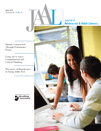
JOURNAL OF ADOLESCENT & ADULT LITERACY
Scope & Guideline
Connecting Research and Practice in Literacy Education
Introduction
Aims and Scopes
- Multimodal Literacy Practices:
The journal emphasizes the importance of multimodal literacy, exploring how various forms of communication (text, visual, digital) can enhance understanding and engagement in literacy education. - Culturally Sustaining Pedagogy:
A core focus is on culturally sustaining pedagogy, which advocates for teaching practices that recognize and honor students' cultural backgrounds, thereby fostering inclusivity and equity in literacy instruction. - Critical Literacy and Social Justice:
The journal promotes critical literacy as a means to empower students to challenge social norms and injustices, encouraging them to engage with texts and media in ways that foster critical thinking and activism. - Digital Literacy and Technology Integration:
Research in the journal reflects a growing interest in the integration of digital literacy and technology in teaching practices, exploring how these tools can enhance literacy development and engagement among learners. - Collaborative Learning and Community Engagement:
The journal highlights the significance of collaborative learning experiences and community engagement in literacy education, emphasizing partnerships between educators and communities to support diverse learners.
Trending and Emerging
- Digital Storytelling and Media Literacy:
There is a growing trend in exploring digital storytelling as a means to enhance media literacy, particularly how adolescents engage with and create digital content in educational settings. - Translanguaging and Multilingual Education:
Emerging research increasingly focuses on translanguaging practices, recognizing the fluidity of language use among multilingual learners and how these practices can enrich literacy instruction. - Youth Activism and Literacy:
The intersection of literacy and youth activism is gaining prominence, emphasizing how literacy education can empower students to engage in civic action and social justice initiatives. - Critical Media Literacy:
There is an uptick in studies addressing critical media literacy, highlighting the importance of teaching students to analyze and critique media messages and representations in today's digital landscape. - Emotional and Affective Literacies:
Research is increasingly acknowledging the role of emotional and affective literacies in literacy education, exploring how emotions influence learning and engagement in literacy practices.
Declining or Waning
- Traditional Literacy Instruction:
There is a noticeable decrease in publications focused on traditional literacy instruction methods, as the field increasingly embraces more progressive and inclusive pedagogies. - Standardized Literacy Assessments:
Research on standardized assessments and their role in literacy education has diminished, reflecting a growing critique of such measures and a shift towards more holistic and formative assessment practices. - Monolingual Literacy Practices:
Themes surrounding monolingual literacy practices are less frequently addressed, as the journal increasingly focuses on multilingualism and the literacy needs of diverse language learners. - Text-Centric Approaches:
There is a decline in research centered solely on text-centric approaches to literacy, as the field moves towards recognizing the importance of context, audience, and various modes of communication. - Literature Canon and Canonical Texts:
The focus on canonical literature and traditional literary texts is waning, as the journal seeks to highlight diverse voices and texts that reflect contemporary issues and marginalized perspectives.
Similar Journals
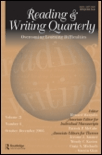
Reading & Writing Quarterly
Exploring the intersection of reading and writing.Reading & Writing Quarterly, an esteemed journal published by Routledge Journals, Taylor & Francis Ltd, stands as a pivotal resource in the fields of education and linguistics. Established in 1992, this journal has gained recognition for its rigorous scholarly contributions, reflected in its impressive Q1 ranking in both Education and Linguistics, as well as notable placements in the Scopus rankings (75th and 330th percentiles respectively). With its commitment to advancing research on reading and writing processes, practices, and pedagogy, Reading & Writing Quarterly continues to inform and engage an audience of researchers, educators, and students keen on effective literacy instruction and research. While this journal does not provide open access options, its rich content remains a vital asset for those invested in the evolving landscape of literacy education. Based in the United Kingdom, it is positioned not only as a national treasure but also as a significant contributor to global educational discourse. Explore the insights and research that shape contemporary practices in literacy education through this highly respected publication.
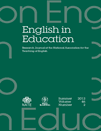
English in Education
Championing Scholarly Excellence in Language and LiteratureEnglish in Education, published by Taylor & Francis Ltd, is a premier journal dedicated to the broad field of education, with a specific focus on the interplay of language, literature, and pedagogy. Since its inception in 1964, this esteemed journal has become a vital resource for researchers, educators, and students alike, offering a platform for innovative research and scholarly discourse. With an impressive impact factor and categorized in the top quartiles of both Linguistics and Language, and Literature and Literary Theory, it ranks among the top journals in its field, denoting its significance and influence. The journal aims to advance understanding and practice in English education through rigorous peer-reviewed articles, theoretical explorations, and empirical studies that address contemporary challenges and developments in these intertwined disciplines. The journal’s commitment to excellence is reflected in its Scopus rankings, highlighting its critical role in fostering research that informs and enriches educational practices. Although currently not open access, English in Education remains an essential outlet for professionals seeking to contribute to the evolving landscape of English language and literature education.
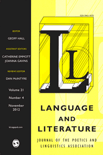
Language and Literature
Illuminating the Dynamic Relationship Between Words and MeaningLanguage and Literature is a premier academic journal published by SAGE Publications Ltd, focusing on the dynamic interplay between linguistics, literature, and literary theory. Established in 1996, this prestigious journal holds a distinguished position within the academic community, reflected in its Q1 ranking in both Linguistics and Literature & Literary Theory as of 2023, placing it among the top journals in its field. With a robust impact demonstrated by its high Scopus rankings—ranked #24 out of 1106 in Literature and Literary Theory and #219 out of 1088 in Language and Linguistics—Language and Literature provides a vital platform for innovative research and discourse, particularly relevant for scholars and practitioners aiming to explore cutting-edge developments in language studies and literature. While the journal does not currently offer Open Access options, its comprehensive and scholarly publications continue to contribute significantly to the advancement of knowledge and understanding in these interdisciplinary fields. We invite researchers, professionals, and students to engage with our content and contribute to the vibrant dialogue that shapes our understanding of language and literature.

Language and Literacy
Celebrating the Intersection of Language and LearningLanguage and Literacy is an esteemed journal published by LANGUAGE & LITERACY RESEARCHERS CANADA, focusing on the vital intersections of language acquisition and literacy development. With a commitment to open access since 1999, this journal provides a platform for researchers and practitioners to share innovative findings and pedagogical insights that enhance the understanding of language and literacy in various educational contexts. The journal aims to foster a dialogue among educators, researchers, and policy makers by disseminating high-quality research and facilitating discussions on best practices. Recognized for its contributions to the field, Language and Literacy serves as an indispensable resource for those dedicated to improving literacy outcomes and language education globally. Based in Victoria, BC, Canada, it invites submissions that explore theoretical frameworks, empirical studies, and applied research, thereby enriching the academic community’s knowledge base.
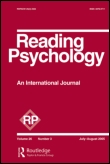
Reading Psychology
Fostering Understanding of Reading ProcessesReading Psychology, published by Routledge Journals, Taylor & Francis Ltd, is an esteemed journal dedicated to exploring the multifaceted relationship between reading processes and psychological principles. Since its establishment in 1979, this journal has provided a crucial platform for researchers, educators, and psychologists, addressing pivotal themes in Developmental and Educational Psychology, Education, and Linguistics and Language. With a commendable impact factor and a robust ranking within Scopus across multiple categories, including Q1 in Linguistics and Language, Reading Psychology plays an indispensable role in advancing scholarly discourse. Although it currently does not provide Open Access options, it remains a vital source of innovative research that informs theory and practice. The journal aims to cultivate a deeper understanding of reading behaviors, foster interdisciplinary collaboration, and ultimately enhance educational techniques, making it essential reading for anyone committed to the study of reading and cognition.
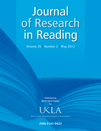
JOURNAL OF RESEARCH IN READING
Illuminating the path to effective reading instruction.JOURNAL OF RESEARCH IN READING, published by Wiley, stands as a premier scholarly platform dedicated to advancing the understanding of reading research within the disciplines of education and psychology. Established in 1978, this impactful journal offers rigorous peer-reviewed articles that explore the multifaceted nuances of reading processes, literacy development, and instructional strategies, making it an essential resource for educators, psychologists, and researchers alike. With an impressive Q1 ranking in developmental and educational psychology, education, and miscellaneous psychology categories, and notable positions in Scopus rankings, the journal maintains a strong reputation for the quality and relevance of its contributions to the field. Although it operates under a traditional subscription model, the journal ensures broad access to its vital research findings, supporting the ongoing dialogue in an ever-evolving academic landscape. As it approaches its landmark 2024 edition, JOURNAL OF RESEARCH IN READING continues to serve as a vital conduit for innovative research and critical insights into literacy and reading education.

Ocnos-Journal of Reading Research
Bridging Theory and Practice in Reading ResearchOcnos-Journal of Reading Research is a leading peer-reviewed journal dedicated to advancing the field of reading research, with a specific focus on literature, education, and psychological aspects of reading. Published by UNIV CASTILLA-LA MANCHA, CENTRO ESTUDIOS PROMOCION LITERATURA INFANTIL, this open-access journal, available since 2005, aims to provide a platform for innovative studies, critical reviews, and educational resources that inform and inspire scholars, practitioners, and students alike. With an impressive positioning in the Q2 category in Education and Q1 in Literature and Literary Theory as of 2023, it is recognized for its high impact in these disciplines, evidenced by its strong rankings within Scopus. Situated in Cuenca, Spain, Ocnos fosters international dialogue and research collaboration, making it a vital resource for those engaged in the exploration of reading as a multifaceted phenomenon. Whether you are interested in theoretical frameworks or practical applications, Ocnos offers invaluable insights that contribute to the field's evolution and understanding.

Australian Journal of Language and Literacy
Shaping the future of literacy and language studies.The Australian Journal of Language and Literacy, published by SpringerNature, is an esteemed platform for advancing research in the fields of linguistics, language, and education. With an ISSN of 1038-1562 and an E-ISSN of 1839-4728, this journal has been a crucial resource since its inception in 1997, now converging into its 2024 volume. It proudly holds a significant position within the Q2 category in Linguistics and Language and a Q3 classification in Education for 2023, reflecting its commitment to high-quality scholarly content. With impressive Scopus rankings in arts and humanities and education, it engages a diverse audience of researchers, educators, and linguists. Although this journal is not open access, it remains an essential resource for those seeking to enhance their understanding of language acquisition, literacy development, and pedagogical approaches. By contributing to the discourse in these vital areas, the Australian Journal of Language and Literacy plays a pivotal role in shaping the educational landscape in Australia and beyond.

Journal of Language and Literacy Education
Elevating Educational Practices Through Rigorous ResearchThe Journal of Language and Literacy Education, published by the University of Georgia, College of Education, is an essential resource for researchers, educators, and students engaged in the dynamic field of language and literacy. With an ISSN of 1559-9035 and a commitment to open discussions on contemporary educational practices, this journal aims to bridge the gap between theory and practice, fostering innovative pedagogical approaches that resonate with diverse learning communities. Operating from 427 Tucker Hall, Athens, GA 30602, the journal holds a notable position in the Social Sciences - Education category, ranked at #854 out of 1543 in Scopus, with a 44th percentile standing. Spanning a converged period from 2020 to 2024, it offers a platform for cutting-edge research, critical reviews, and discourse surrounding language acquisition, literacy development, and educational strategies. Engaging with this journal not only enriches academic pursuits but also elevates professional practices within the field.
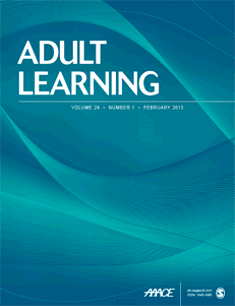
Adult Learning
Connecting Theory and Practice in Adult Education.Adult Learning is a well-respected journal published by SAGE Publications Inc. that has been a cornerstone in the field of education since its inception in 1989. With an ISSN of 1045-1595 and an E-ISSN of 2162-4070, this journal focuses on the dynamics of adult education, exploring innovative practices, theoretical frameworks, and empirical studies aimed at enhancing adult learning experiences. Recognized as a Q2 journal in both Education and Social Sciences (Miscellaneous) categories, it boasts an impressive ranking in the 63rd percentile for Social Sciences and a 50th percentile for Education as per Scopus metrics. The journal fosters a scholarly conversation among researchers, practitioners, and policy-makers, making it an essential resource for anyone interested in advancing the understanding and practice of adult education. Accessible through various academic institutions, Adult Learning serves as a vital platform for disseminating cutting-edge research and innovative practices in the field.